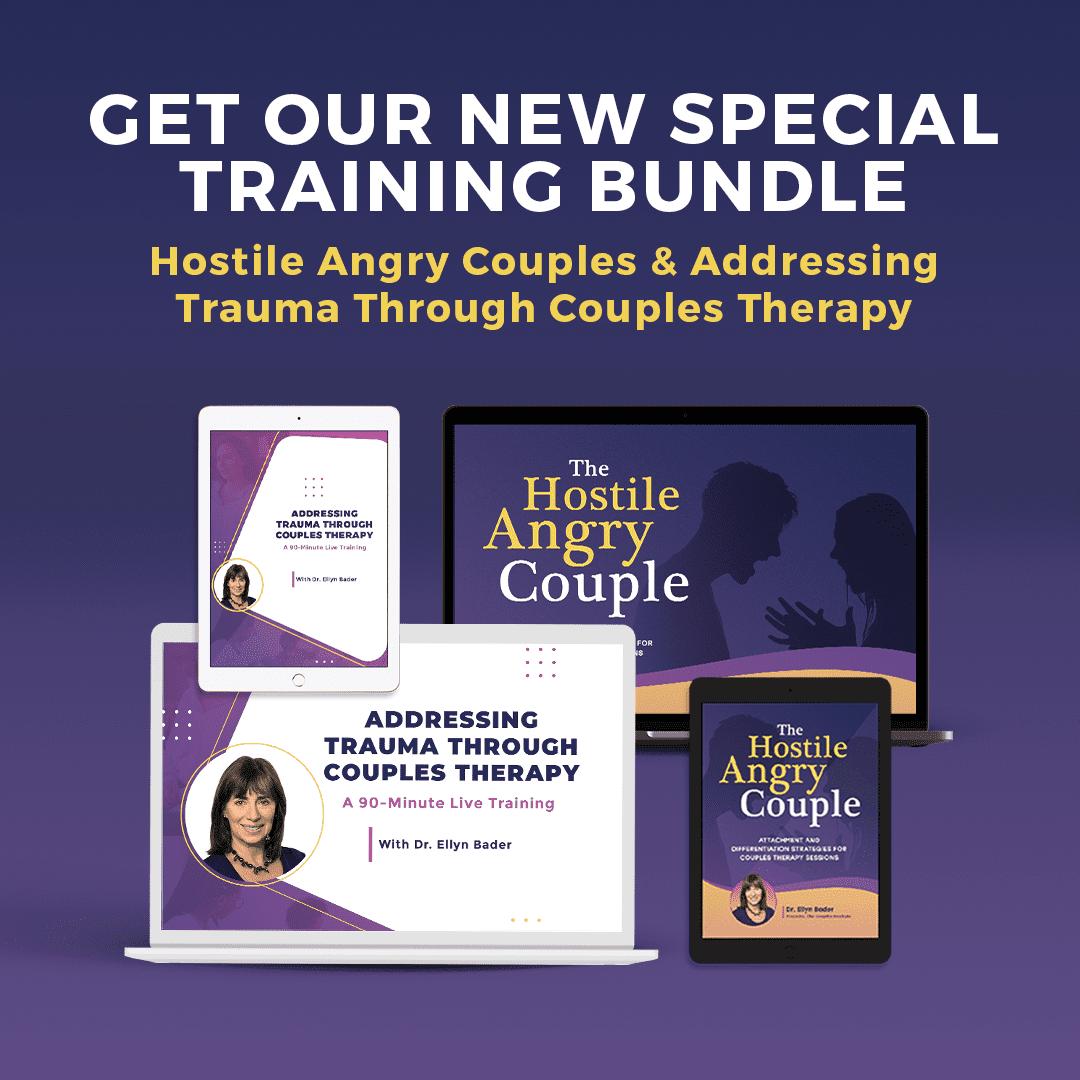Do you feel anxious before sessions
with hostile couples?


When couples activate each other, you need much more than intuition.
To solve their issues for good, you need to know what’s really going on.
One main reason you haven’t made progress with these couples is because these partners confuse behavioral change with developmental change.
They’ll say something like, “I want my partner to express more emotion,” or “I’d like my partner to be more empathic.”
They’re asking for something that takes place over time, but they treat it as if it’s as easy as learning to tie a pair of shoes.
What they’re asking isn’t wrong. Or bad. In fact, it would enrich the relationship. But they have to understand that what they are asking for does not come easily or naturally for their partner.
When this game of “I need you to change” escalates, couples become critical, hostile, and demanding.
And they ask you to change it.
Do you know how?
In our 30+ years of training professionals, we discovered that fighting couples top the list of things that prevent therapists from wanting to work with couples.
Too many therapists feel anxious working with these couples. They get lost and wander through sessions.
They feel out of their depth. Unproductive. And they carry around the stress afterwards.
So we took a look at all the reasons that fighting couples gnash at each other – trauma re-enactments, resentments, hostility – and put together the solution to lead your couples out of the dark.
Introducing our special training bundle…
The Hostile Angry Couple &
Addressing Trauma Through Couples Therapy
- Establishing Ground Rules as a Way of Containing Conflict
- 7 Major Things that Create Change
- 5 Effective Goal Setting Questions
- Statements to Look For as the Couple Evolves
- The Initiator-Inquirer Process
- Rapid Repair of Relationship Ruptures
- Setting Limits on Conflict

When couples are re-enacting trauma or repeating fights, it’s hard to break through. They likely can’t hear you because of the stored pain from when they were invalidated or criticized as a child.
You need tools to break through their defensive walls.
That’s why we included…
- A comprehensive summary for understanding and working with hostility
- 6 key areas to target change
- 6 principles for managing volatile sessions
- How to interrupt the laundry list of complaints and move the session forward
- Education about the brain and how that does the heavy lifting in sessions, so couples can finally recognize their patterns and break free of them
On Sale Until November 14
This bundle also covers…
- The 5 different types of trauma
- Understanding how early developmental trauma impacts couples’ development
- Deciding what is best addressed in individual therapy or couples work
- How couples therapy is uniquely suited to help trauma survivors develop a voice
- The role of shame and how it affects couples’ development
- When and how to address past interpersonal trauma when a couple entered therapy for a different issue
When you order now, you’ll get…
- A 62-page guidebook and transcript to a training seminar on hostile-angry couples
- The exact slides used in the seminar on hostile angry couples
- 2 audio one-hour seminars discussing the hostile angry couple
- A 90-minute webinar on trauma and couples therapy
- The exact slides used in that webinar
As a bonus, you’ll get the following handouts!
- Ineffective Behaviors Partners Use to Cope
- The Hostile Dependent (Angry Escalating) Relationship
- General Principles When Working with Hostile Dependent Couples Setting Limits on Conflict
The Hostile Angry Couple
&
Addressing Trauma Through Couples Therapy Bundle
41% OFF!
Check out what other therapists are saying...


Meet Your Teacher, Dr. Ellyn Bader


“But Ellyn, I’m not seeing very many couples in my practice currently.
Can this still help me?"
YES!
Whether you work with couples or individuals, you’re bound to end up with an angry client in your office. The tools you learn in this guide help you manage the anger in a constructive way and support your leadership in high intensity situations.
If you’re interested in seeing more couples, this guide equips you with what you need to feel comfortable taking on new clients, especially ones with built up resentment and bitterness. And you’ll learn a proven way to recover if you’ve made a mistake or if the couple doesn’t respond well to something you’ve asked or said (all is not lost)!
You’ll also discover how to structure the first few sessions with these clients so they don’t have the same complaints about you that they have about therapists they’ve worked with in the past.

 We respect your privacy,
We respect your privacy,